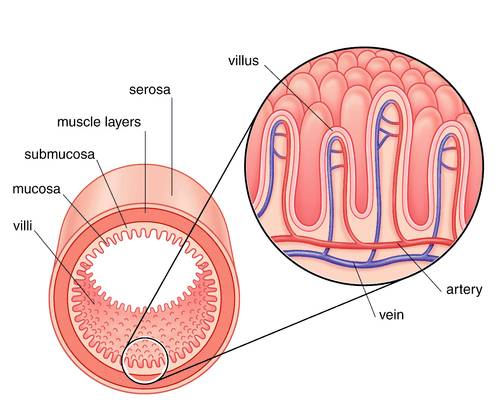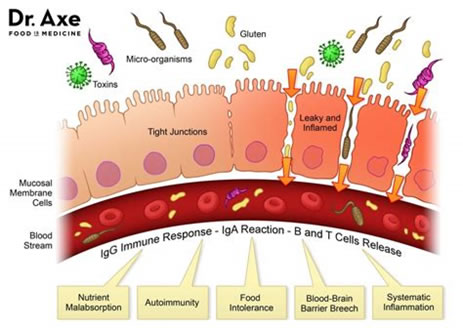Do you know if you have leaky gut? Leaky gut, also known as enhanced intestinal permeability, can be a major contributing factor to gut health issues, systemic inflammation, autoimmune diseases and skin issues. Everyone has some degree of leaky gut and for many, it is a driver of disease in the body.
Background Information

First we need to understand the structure of the small intestine.
Imagine your small intestine is a bendy straw through your abdomen. The straw is made up of individual cells next to each other. Facing inward, these cells have many finger-like projections, called villi, which protrude into the middle of the gut, called the lumen. These villi are designed to increase surface area in the gut so that we can absorb fully digested vitamins, minerals, carbohydrates, proteins and nutrients into the blood stream. Fully digested fats are absorbed into the lymph system. This allows the nutrient to cross from the lumen into our circulatory systems to then be used throughout the body
This design allows select particles, like nutrients, to enter the body while keeping bacteria, toxins and undigested food out of the blood stream.
What is Leaky Gut?

With enhanced leaky gut, the spaces between the individual gut lining cells start to increase. These spaces, know as tight junctions, become increasingly bigger due to inflammation in the gut. Now, these undigested food particles, toxins and bacteria that were previously blocked from entering our circulation, can freely cross our gut lining into the rest of our body.
As these toxic particles leave our small intestine, the body mounts an immune attack against these potentially dangerous foreign invaders. This creates a chronic low grade inflammatory response that worsens leaky gut and increases inflammation throughout the whole body.
The villi can also become damaged and prevent nutrients from being properly absorbed.
What are symptoms of leaky gut?
Symptoms of leaky gut can range dramatically in severity and location of where symptoms occur. Here are some of the most common issues that leaky gut can cause or contribute to:
- Digestive issues: IBS, bloating, constipation or diarrhea
- Food sensitivities*
- Skin conditions like acne, eczema or rosacea
- Joint pain
- Inflammatory Bowel Disease
- Brain fog
- Anxiety, depression
- Autoimmune diseases
- Nutrient deficiencies
What causes leaky gut?
There are many contributing factors as to why someone may have increased intestinal permeability. Many of us will have multiple factors that compound to make the “perfect storm”.
Here are some common causes of leaky gut:
- Antibiotics
- Pesticides, heavy metals, mold and other toxins
- Alcohol
- Highly processed and inflammatory foods
- Stress
- Consuming foods that you have an allergy or foods sensitivity to
- Dysbiosis of gut bacteria – SIBO, fungal overgrowths, low beneficial gut bacteria, parasites
- NSAIDs
- Oral contraceptives
- Low fiber or low antioxidant diet
- Check out: 5 ways to increase your fiber intake
*A note on Food sensitivities:
Some individuals inherently have food sensitivities and when those foods are consumed, inflammation in the gut increases, which then increases leaky gut.
Others may have leaky gut due to other factors. This can then cause new food sensitivities to foods, especially foods that are eaten often. Once the gut is healed, these individuals can re-introduce these foods again.